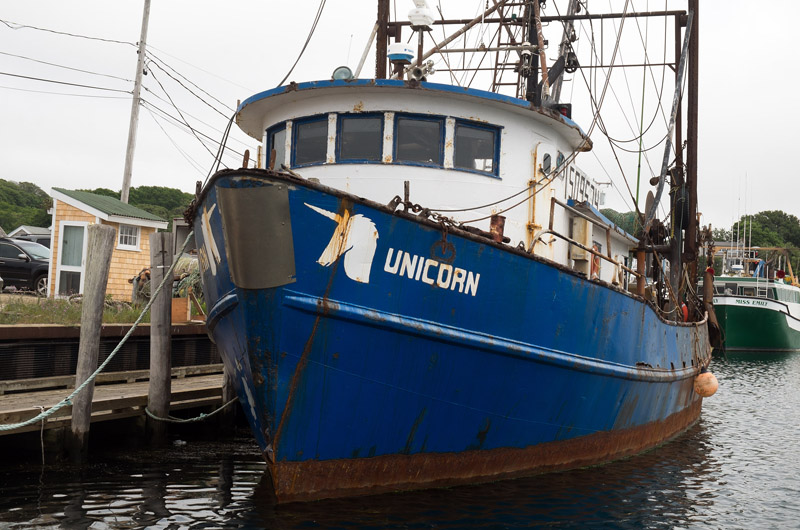The Nature Conservancy, working with the Martha’s Vineyard Fishermen’s Preservation Trust, has purchased the Island’s last historic groundfish permit, marking a major milestone in the trust’s efforts to develop a permit bank to support Island fishermen.
The federal New England multi-species permit, also known as a groundfish permit, was held by Greg Mayhew, owner of the Unicorn, a legendary 75-foot dragger out of Menemsha.
“We wanted our fishing permit to stay on Martha’s Vineyard and not go to some corporation or conglomerate,” Mr. Mayhew said in a statement issued Thursday by the conservancy.
Among other challenges facing local fishermen, the decline in groundfish populations in recent years has led to smaller quotas, leaving many businesses unable to compete. Since regrouping last year, the fishermen’s preservation trust has concentrated on developing a permit bank that would allow Vineyard fishermen to lease quota at an affordable rate.
Christopher McGuire, marine program director for The Nature Conservancy, said the Unicorn permit might only support one or two Island fishermen, since the quota is limited.
“There is only so much fish to lease out,” he said. But he added that there are relatively few groundfishermen on the Island, so competition for the quota might be light.
He declined to comment on the cost of the permit, saying only that prices for fishing permits can range from $20,000 to $2 million. The recent purchase, along with four others in partnership with the Cape Cod Commercial Fishermen’s Alliance in Chatham, were funded by private donations directed toward the group’s fisheries work and permit acquisitions.
The two groups are now working on an option agreement that would allow the Vineyard fishermen’s trust to buy the Unicorn permit outright in the future, at no more than the cost paid by the Nature Conservancy. Mr. McGuire hoped that permit values in general would increase in the next few years as fish populations rebound. But on average, he said, permit values over the last two years have declined.
“Our goal is for communities to own permits,” Mr. McGuire said. “An ideal situation would be in five years the resource is rebounding, permit values have increased . . .” that would give the Vineyard a “sweetheart deal” in buying the Unicorn permit.
The conservancy has been involved in permit banking since the mid-2000s, working with communities in California, Maine and New Hampshire. The recent acquisitions on the Vineyard and the Cape are its first in Massachusetts.
One approach for permit banks is to focus on buying up locally-held permits so the quota will stay within a community. But it’s unclear whether that strategy will work on the Vineyard, since there are so few groundfish permits here to begin with, Mr. McGuire said.

The Unicorn joined the Menemsha fleet in 1984. At one time she shared the harbor with several commercial draggers, including her sister ship, the Quitsa Strider. Both draggers were owned by the Mayhew family in the heyday of commercial fishing, when a large commercial fleet plied the rich offshore fishing grounds on Georges Bank, among other places. The Quitsa Strider was sold for scrap metal last year.
For many on the waterfront and beyond, the Unicorn is a reminder of brighter days for the Island fishing industry, although today the old dragger has deteriorated.
Wes Brighton, a commercial fisherman and trust member, earlier this month blamed its decline on the many regulatory and financial challenges facing small-scale commercial fishermen. “It is essential that we help our fishermen secure access to our historic fishing grounds,” he said in the statement this week.
The fishermen’s trust is working to increase awareness about the plight of commercial fishing on the Island, and among other things plans to hold a Meet the Fleet event in Menemsha early next month.
Shelley Edmundson, a PhD candidate at the University of New Hampshire who is serving as treasurer for the Island trust, noted the Unicorn’s status as a Vineyard icon.
“Seeing it go is hard,” she said. “But if it can’t fish, I guess it has to make room for people who can.”








Comments (7)
Comments
Comment policy »